I was John Cage's last student...
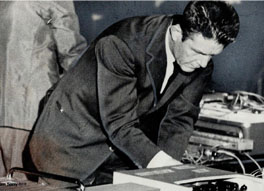

The Start
I first heard of John Cage in 1973 when Milos Velimirovich, one of only three Byzantine Chant scholars in the US at the time, heard my music and told me that I should not be studying music at the University of Virginia, where he was Head of the Music Department, but that I should be studying with John Cage.
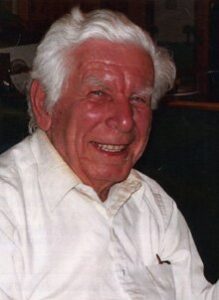 Milos Velimirovich
Milos Velimirovich
I read six of Cage's books. The first was Notations. The radical nature of this work was revolutionizing. Notations contains over 300 hundred one-page examples of contemporary music.


This book gave me direction and courage. I could now notate the music I was hearing...(See the below score for, "The Angry Man”, which is still performed, regularly, 47 years later)
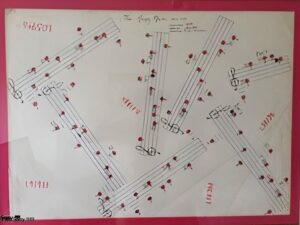 The Angry Man
The Angry Man
Jimi Hendrix's Are You Experienced album was very influential in my life, so I left the University of Virginia and went on the road as traveling musician for four years, as Hendrix had.
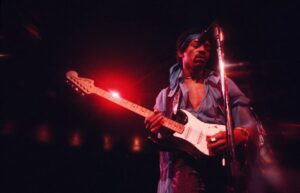 Jimi Hendrix
Jimi Hendrix
In early 1976, frustrated with the road and with the arrogance of youth, I wrote John Cage and said simply "Beethoven studied with Hayden, you studied with Schoenberg, therefore I should study with you". He said "No"...in a letter that is still on my wall today.
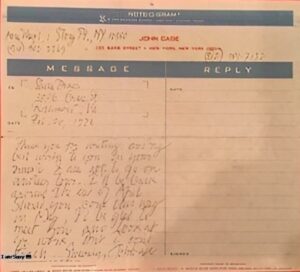
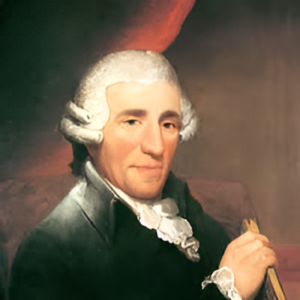 Hayden
Hayden
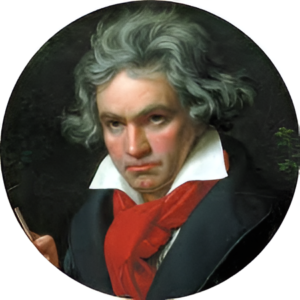 Beethoven
Beethoven
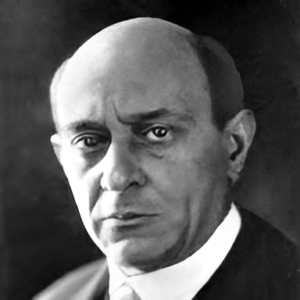 Schoenberg
Schoenberg
On Monday July 26, 1976 I called John Cage and asked to see him. He agreed and on Thursday July 29, 1976 we met for the first time.
I showed him my first piece, something I had written for John McLaughlin, the first guitar player that Miles Davis ever used (Bitches Brew). I had an in with Shelley Schultz of International Creative Management who booked McLaughlin. It was a screaming fast jazz-rock piece that was so in style at the time, but it's melody was intervallic, via Schoenberg, who was Cage's own greatest teacher and it caught his ear. I'll never forget that curiously surprised look of respect on his face. I felt like a million dollars. Here was the greatest composer on earth respecting my work...We had another drink.
 John McLaughlin at his peak
John McLaughlin at his peak
 Miles Davis reaching for his
Miles Davis reaching for his
John Cage was a very graceful man. He had a little boyish smile that would slyly light up his face when he thought he was getting away with something that he thought you weren't wise enough to understand yet. A look I would learn to recognize quickly and often.The next piece I would show him, below entitled “George Eliot is Beautiful, Part 3, for Bass Flute”, was also “fusion”, but with an even more dissonant and widely angular intervallic melody.
Once again, there was the look of respect and recognition. I've got to say that, after being present at the birth of my daughter, it was the most thrilling moment of my entire life. He could see past the transiently stupid jazz/rock harmonies and silly imperfect meter of the day and he could hear my melodies. I was in!... we had another drink.
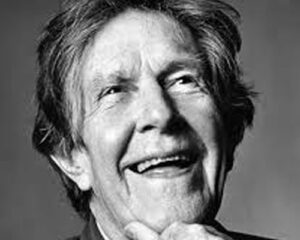
I knew, when I first walked in Cage's front door to his loft, and a man who looked more like a heating and cooling installer from Des Moines, than the greatest intellectual Titan the music world had seen since Richard Wagner and before that Beethoven himself, that this was the most intelligent person I had ever met and probably would ever meet. Cage wasn't humble. He was meek...but extremely, extremely strong. To face the world with 4'33'' and essentially say "I know what I'm talking about, and you don't, and even if you abuse me for it, I will still love you by continuing to do it", took staggering strength.

I showed him Fais Voile, a Debussyian harmonic exploration, (retitled here below as " George Eliot is Beautiful, Part 1, for Bass Flute”). I watched his face. It was almost perfectly motionless.

Arnold Schoenberg had revolted against the bloated post-Wagnerian romantic excesses of his time. Cage revolted, musically, against the 'expressionism' of Schoenberg's intensely brilliant, angularly melodic, contrapuntal intellectualism.
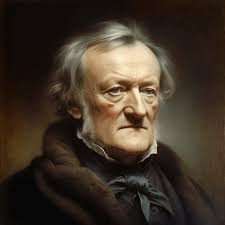 Wagner
Wagner
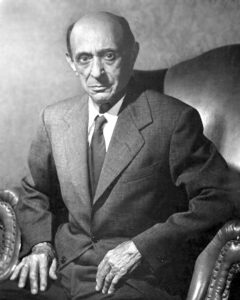 Schoenberg
Schoenberg
But, Cage's father was an inventor and maintained the scientific detachment necessary to do that type of work. That was in Cage's soul...hardwired. His Daddy's influence would color every thought he would ever have. Had Cage gone one step farther with it would have appeared, in his personality, as icy...but he didn't, and it gave him the detachment necessary to look at music, from Gregorian Chant until 1952, and decide that it was time to pull the temple down on all of us...and he did.

John Cage's Father
Cage was the Samson that essentially ended Western Music and set the stage for the pluralistic world music that is currently in vogue.
So, I watched him closely as he listened to this piece. The slightest EMDR twitch in his face, and I knew he didn't like it...Uh oh.
Finally, I showed him Freight Door Charlie, a hysterically fast fusion piece that used not just intervallic phrases, but four actual 12 tone rows. Cage, being Schoenberg's student, could hear it!
I saw the smile that even his father-bred detachment could not restrain...
Cage and Schoenberg had had it out one day when the second greatest musical genius of the 20th century (Schoenberg) attacked the greatest musical genius of the 20th century (Cage) after examining a piano exercise of Cage's and saying " If you have no feel for harmony then you will bang your head against the wall, all your life," to which Cage replied, curtly, "Then I will devote myself to banging my head against that wall"...which he certainly did.
 "War between Titans"
"War between Titans"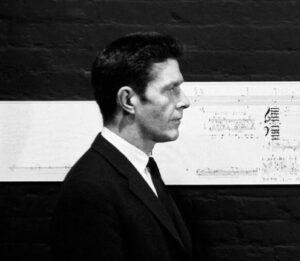
Compositional direction
Over an eight month period I would go to Cage's loft on Wednesdays, bring scores, recordings and something to drink.
Secondly, "Listen to what you like, see what you like about it, and do something different with it."
Thirdly, "Listen to what you don't like, find out what it is, and don't do that."
And finally, "Get with people who have similar interests" to which he gave me John Lennon's address...Wow!!!
Mr. Cage and I were listening to a piece of my music that night called “First Movement” (See one page score below). It was a screaming solo electric guitar piece, strings tuned in perfect fourths, recorded at midnight in Cabell Hall, a domed auditorium that Thomas Jefferson had designed. It was actually the piece that Dr. Milos Velimirovich had listened to which had prompted him to recommend that I study with Cage.
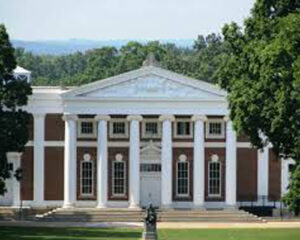
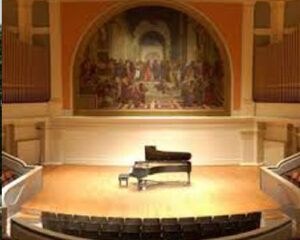
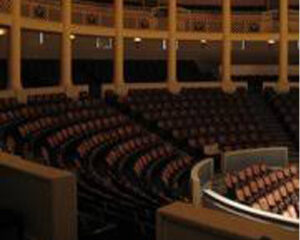
Cabell Hall
As we listened, Cage got that ‘struck‘ look. The one he always got when he had a new idea (which was often). I liked being around him when that happened. It looked partially like a child’s wonder and playfulness and partly like he was being possessed, in an avuncular sort of way. More the former.
But while each idea was new, neither he, nor I, were afraid of what was about to rush from his head...more eager than anything else.
That's the thing about genius. Schoenberg postulated about that a good bit. What I saw in Cage, and other geniuses, was that 'new information' looks more revealed than anything else to the 'carrier', than derived from really hard work from rugged individualists...
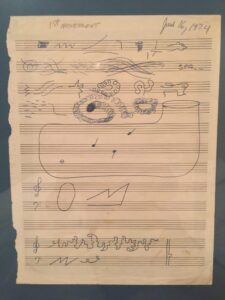 First Movement
First Movement
Yoko Ono and John Lennon
After Cage listened to First Movement he said “You know there’s a guitar player you should play with…John Lennon, have you ever heard of him?"...Trying to look non-plussed, but appropriately appreciative, I said “Yes, Mr. Cage, I know who John Lennon is”…
Yoko Ono, earlier, who lived literally next door, at 106 Bank Street, was also one of Cage’s students, but Mr. Cage had no real idea who the Beatles were or their significance. It’s funny, but I was less a star struck kid around Cage than I was of the possibility of John Lennon.
What I remember, secondly, about Yoko Ono was that she had been getting blamed for breaking up the Beatles.
Thirdly, what I remember was that she had worked with Cage in the early 60's and was an avant garde visual artist of note (Forget her musical stuff, guys...I know, I know). So that when Lennon got to the U.S. to live she was the only woman who kind of disdained him, for not being a serious artist...that was right in John's wheel house, coming from the abandoned childhood he had come from.
What I remember mostly though was that she was making it hard for me and Cage to drink. It was impossible to gauge what kind of liquor to bring Cage. He was always changing. I'd bring bourbon and he'd be drinking wine. I'd bring wine and he'd be drinking Vodka, which later he seemed to prefer. Each time he would say that Yoko had 'recommended' something different for him. She was big into Macrobiotic at the time. All I knew at the time, as I as desperately trying to please Cage, was that I was wasting good drinking liquor.
Actually, he didn't require a lot of effort to be pleased. He had a genuine Lao Tzu-ian interest in people (it really looked more Taoist than Zen to me), but I did notice over time, that he seemed to like new people over repeat people, the same way he liked endless access to fresh new sounds.
Lennon never contacted me, which I frankly, and rather selfishly and self-centeredly, took personally. What I did not know at the time was that he was in the depths of his heroin addiction and was physically immobile most of the last five years of his life. Sad stuff.


Yoko and John
Dinner, humility and Marcel Duchamp
I made an incredibly stupid social mistake that evening. In Cage's humility in serving me, I momentarily thought of myself as superior. It was only a nano-moment, but he saw it, smiled in an avuncular and forgiving way, and kept preparing the meal.
Afterwards he asked if I wanted to play chess. I knew from my studies that he had played with Marcel Duchamp and considered Duchamp to be the greatest artistic mind in the 20th century, as well as a being a world class rated chess player. We played, vigorously. He beat me easily but when I refused to die he complimented greatly and generously "Mr. Dukes, you have pluck".
Cage had so much giftedness that it was not a diminishment for him to give to others amply, which made it easy to feel good about myself.
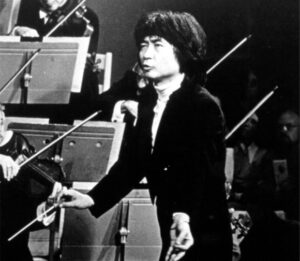
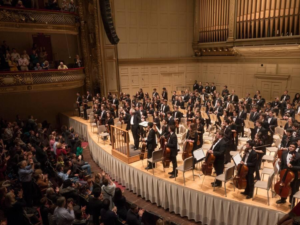
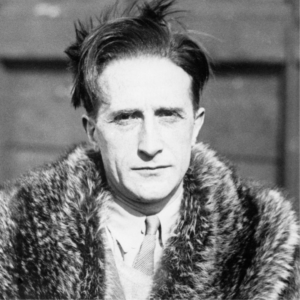 Marcel Duchamp
Marcel Duchamp
I was broke as a snake, and a week later I wrote him and asked him how to get tickets. If I'd have been more honest, I would've said "Would you give me a free ticket?". Here, is his reply:
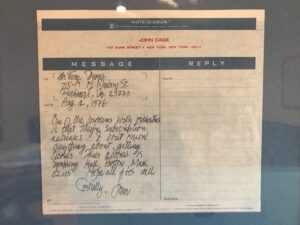
The night was over. We were very drunk and I went out into the New York City night, smiling from ear to ear...
In a day before iPhones, the internet and fourteen years before digital cameras, I did not take one picture of us together. At 21, I thought this illustrious time would last forever...
Renga with Apartment House 1776
On my 22nd birthday, September 29, 1976 I gave myself the present of a 12 hour train ride to Boston to hear the the world premiere of Renga with Apartment House 1776.
I was backstage with Cage and he was beatific. He had a weaved wooden basket overflowing with mushrooms that he was passing out like a young girl passing out daisies. He asked if I wanted some, but my experience with mushrooms, up to that point, had been limited, and of the illegal variety, and I kindly thanked him and declined.
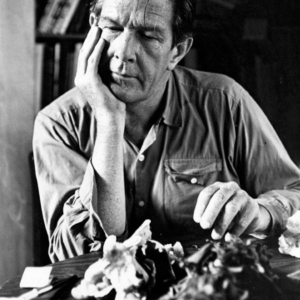 Cage The Mycologist
Cage The Mycologist
Musically, at 22, I loved Hendrix, Beethoven and Cage's music. But at the time, it was really only Beethoven's music, particularly his 3rd, 5th, 6th and 9th Symphonies that I had as a frame of reference for classical music repertoire.
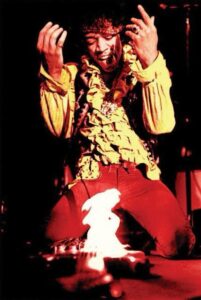 Hendrix
Hendrix
What I heard coming from the stage was the most beautiful, obstreperous, cacophonous, most meaningful, completely out of control music I had ever heard. I had no idea that a symphony orchestra could sound that way. There were four singers singing very different songs simultaneously. There were different drummers drumming in different times, at the same time, and the whole orchestra, it so subtly appeared, seemed to be playing completely independent of each other (I couldn't help noticing that one of the double bass players had his car keys out and was 'playing' those.)
The audience reaction was strong and swift. People were leaving. Some were covering their ears. Some were booing, loudly. I literally stood up in my chair and applauded. A resplendent experience. A total musical triumph!
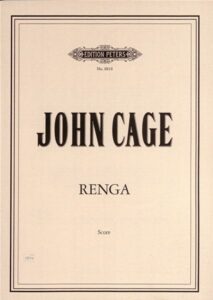
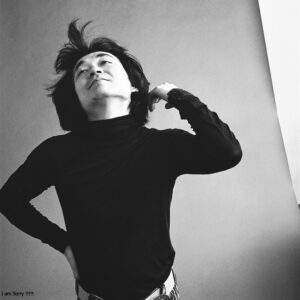
Courage...
People ask me, incredulously, "How did you have the courage to study with John Cage...when he said 'No' ?".
It was really more brains, than courage. I had read the below passage on page six of Silence, his most influential book, and arguably one of the most radical musical works ever written...
"A young man in Japan arranged his circumstances so that he was able to travel to a distant island to study Zen with a certain Master for a three-year period. At the end of the three years, feeling no sense of accomplishment, he presented himself to the Master and announced his departure.
The Master said, "You've been been three years. Why don't you stay three months more?"
The student agreed, but at the end of the three months be still felt that he had made no advance.
When he told the Master again that he was leaving, the Master said, "Look now, you've been here three years and three months. Stay three weeks longer."
The student did, but with no success.
When he told the Master that absolutely nothing had happened, the Master said, '"You've been here three years, three months, and three weeks. Stay three more days, and if, at the end of that time, you have not attained enlightenment, commit suicide."
...Towards the end of the second day, the student was enlightened.
I knew from my reading that Cage's divorce from Xenia Andreyevna Kashevaroff, and his own subsequent coming out was difficult for him and that, while he did not trust psychotherapy, he did trust the Zen Buddhism that he had learned from studying with D.T. Suzuki at Columbia University. I also knew the tales of the recalcitrant Zen masters and the extremes that eager young students went through to study with them, exemplified in the above paragraph.
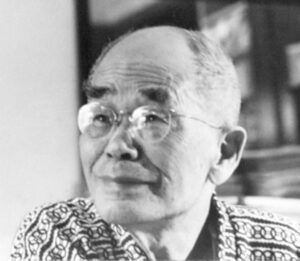 D.T. Suzuki
D.T. Suzuki
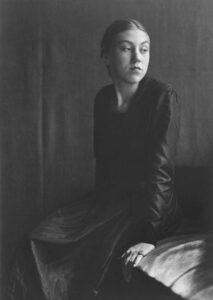 Xenia Andreyevna Kashevaroff
Xenia Andreyevna Kashevaroff
In October of 1977, in what would now be considered stalking: I sold all my possessions, broke my lease, quit my job and drove from Richmond, Virginia to the East Village in New York City where Cage lived. There were no Iphones then so I rolled up to his home at 108 Bank Street with a 7.5 ips Teac reel to reel tape recorder and a pair of headphones, knocked on the door and said "I know you won't teach me, but would you just look at some of my scores and listen to my music and tell me what you think". He answered with his self-described 'sunny disposition' "Yes"...And that was the beginning.
As a Southern boy, I brought Mr. Cage (he asked me to call him John, but I never could) bourbon as a pleasing gift. I noticed very quickly that, while I was fiercely proud of my capacity to hold my liquor, Cage always seemed to slip quickly by me, in the most congenial way, in his out-drinking-me ways.
I knew I could come back...and I did, every week, usually on Wednesday's, for eight months.
Precise musical direction...
I knew John Cage from the beginning of 1976 through May 1978 and worked with him the last eight months of that time. He was the most brilliant musician I have ever met. Utter genius.
I once told him “You are the greatest musical mind of the 20th century and I want to follow in your footsteps”, He said “No, I want you to find your own path”.
I didn't listen to this sagacious advice for three years after my studies with Cage had come to an end. Instead, I moved to Atlanta, started the Noise Orchestra (which allowed no tone producing instruments and refused all money...for purity's sake)...I was living the Cagean aesthetic to perfection.
Then one day in 1979, Bruce Hampton (a monster musical talent of the South) brought over Son House's Levee Camp Moan.
He, like me, was brought up military tough. Feelings were not part of our expressive vernacular.
As we listened we both began to cry uncontrollably.
I suddenly realized what Cage meant that day. I was brought up listening to the emotionally packed blues guitar bends and vibrato of Hendrix...
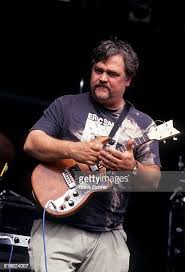
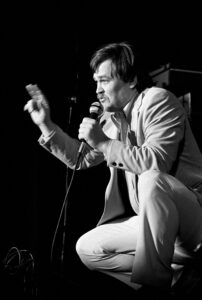 Bruce Hampton
Bruce Hampton
Cage, as usual, was right...
Karlheinz Stockhausen...and drinking
On July 15, 1976, at the opening of the Albert Einstein Spacearium in Washington, D.C., I met Karlheinz Stockhausen (most well remembered, not for his music, but for the incredibly self-centered comments after 9/11 about how he "Was nothing" because he "Couldn't do anything (great) like that").
I was so star struck when I met Stockhausen that I couldn't speak and my friend had to say "John Cage says to say hello"
At first he asked if Cage was still living in the rural Stoney Point, upstate NY, but then there was a sudden thundercloud of venon which overtook his face and he thundered, "He's drowning his brain!".
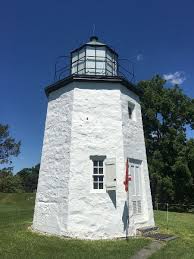 Stoney Point
Stoney Point
Now, I knew that he and Boulez had summarily thrown Cage out of Europe in the 30's when he was trying to play in the sand box with the rest of the young European composer boys and that they recognized his genius was greater than theirs, and that they hated him for it...but that comment, while hurtful and insulting, really stuck with me.
The truth is that Cage always outdrank me...always.
I have mixed feeling about that. I never saw it affect his judgement, except once when he was writing Mesostics. I saw him pause and just rationalize changing the rules. He was an unbelievably accurate, diamond hard, precision worker, so I felt stunned.
On the other hand, in all honesty, his mind was greater than mine and he may have simply understood something that I didn't.
It was the only time, besides the interaction with Stockhausen, that I wondered about his drinking and it's effect on him.
 Stockhausen
Stockhausen
Discipline and Precision...
As to Cage's precision and discipline, on one Wednesday afternoon I walked in and he was leaning and crouching over a large map of Manhattan that was lying on the floor of his studio floor. As always, the light was minimal, as he kind of bristled at incandescent lighting and preferred the natural shadows of incoming sunlight.
I stood there for a long time, in silence just watching him work, remembering Archimedes last words. Finally, I asked him "What are you doing?
He looked up warmly, no more than eight years old, and said impishly smiling "I am making Waltzes".
There were pieces of smooth backed tape, in various lengths, that would be connected to another piece of tape, of the same color, and secured to the map of Manhattan. The end point of one piece of tape would be the start of a walking tour to hear (or record) the sounds in that borough. At the vertex you would change directions and walk in the direction of the second piece of tape, stopping at it's end point. The two endpoints and the vertex constitute three spatial directions and hence...a waltz.
I knew we weren't going to get anything done that day and I went home.
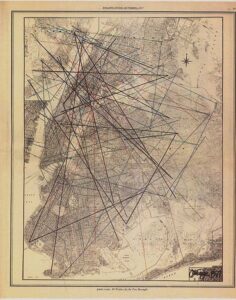
"John Cage's Graphic Score The innovative and influential American composer John Cage created a graphic score called “49 Waltzes for the Five Boroughs” as a tribute to the ever- changing city of New York. He superimposed 49 triangles on a map of New York City, using chance means to determine the locations of each angle. The listener or recorder was invited go to the apex of each angle and listen to or record the sounds of the city in that place."
Rolling Stone Magazine, 1977.
Silence...
One day we were talking about accepting sounds as they were. I brought up the example of "Love Rollercoaster", a January 1976 number one hit, which I had played and found musically wanting. He assured me that that, too, could have musical value.
Cage's indeterminate aesthetic is completely contrary to the fixed medium of all recordings. He wanted not only his composition to be beyond his feelings and thoughts (which is why he used the aleatoric methods of tossing the I Ching), but he also wanted every performance to be fresh and unique.
All that being said, I think the most representative recording of Cage's I have ever heard is Fontana Mix. On that record, many many sound sources are used, a la music concrete' (more like sampling without a beat).
In that setting I could understand what he meant. Trains going by, radio stations being dialed, a horse whinnying, Enrico Caruso...so, why not Love Roller Coaster?
Cage didn't argue. He would simply explain until you could understand what he meant. He had answers to problems that people didn't even know that there were problems with...yet. That is a pedagogical practice I learned from him and have practiced all my life...He simply didn't argue. He elucidated when there was intelligent inquiry...or he was happy to be content with his own silence.
Talking with him made me think of talking to Einstein. In Newtonian physics, parallel lines are parallel into infinity, but when Einstein introduced the idea that the universe was in fact curved Flannery O'Connor's "All things that rise must converge" suddenly makes sense because parallel lines do intersect, eventually...Cage was exactly like that, musically.
Cage told me the story of his experience in an anechoic chamber, how he had heard his own heart beat and therefore concluded that there was never silence, only music, if we only know how to listen. I had read that before in his book "Silence", arguably the most radical book ever written on music theory, but I was entranced by his retelling it with the conviction of the redeemed.
We would discuss, deep into a bottle, or more, around the aesthetics of "Letting sounds be themselves" versus expressing feelings, the blues aesthetic I loved and believed in with the conviction of the Civil Rights movement. But, it was useless...you can't argue with a genius.
Sex and jealousy...
Mostly I was at Cage's house in the afternoons. Unusually, one evening I was over in his loft on Bank Street and I heard a fierce noise, from the second floor of the loft, where I had never been privy to. Storming down the stairs came a very muscular, sleek, older looking gentleman who was wet, newly covering himself in an Asian patterned turquoise/silver robe. He had oddly patterned balding curly hair, a protruding nose, and very long feet. He was not pretty...
But it wasn't his attire, or his body, that was striking. It was the look of totally incensed jealous rage on his face that filled the space. I'm afraid I was a bit naïve and didn't really understand what was going on at the time.
Cage, again, with his self-described 'Sunny disposition', handled it with grace, but there was genuine concern, and a look of beleaguered worry on his face that I had never seen before.
Cage did not mince words, but from his facial expression, I could see that this was not a topic for polite conversation.
That is the only time I met the fiercely jealous Merce Cunningham...fortunately.
I believe Cage's social carefulness, around this issue, was probably due to his watching his second most influential teacher, after Schoenberg, Henry Cowell.
He saw Henry Cowell serve four years, of a fifteen year sentence, in 1937, at San Quentin State Prison, on a "morals" charge for his sexual choices. Cage was a prudent...as well as brilliant man.
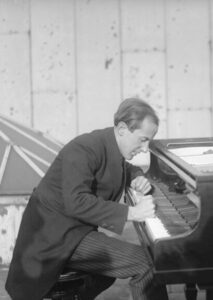
Henry Cowell
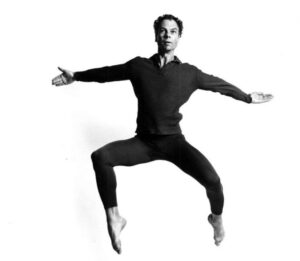
Money...
Being young, I didn't really care about money very much, but one day I did ask Cage "How did you ever make any money?", meaning from his music. From a place that couldn't have been more than five years old, yet fully jubilant, he said "I never made any money until I was 50"
At twenty one, that seemed like an extremely long time to me...I asked him how he made his money until then. He said he worked in an advertising agency.
I asked him when that changed for him, looking for some hope. He said that with the release of his 25 year retrospective concert things changed and that that was when he then began to make money from his music.
32 years later, on November 13, 2009, I was seated next to George Avakian, "Legendary record producer and new music enthusiast", listening to a Henry Cowell performance by a local producer.
I knew Avakian had produced the recording of the 25 Year Retrospective Concert of the Music of John Cage, recorded at Town Hall, New York, May 15, 1958, as a three-record album (Available now on Apple Music).
I told him what Cage and said to me about how that recording was the turning point in his financial musical life.
He said "Cage never made any money...I'm still paying for that record, LOL"
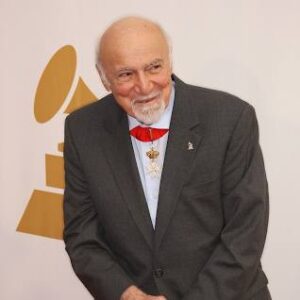
Producer George Avakian
The End...
One day, in May of 1978, I walked in with my newest composition “Music of Changes”, 50 pages of Rorschach Test looking, very angular, pencil markings on 8.5 x 11 white sheets,
named after his 1951 solo piano piece for David Tudor. I said “ The music is supposed to sound like it looks”
Mr. Cage, in his impeccable childlike honesty said “I do not understand what you mean". I was thunderstruck. I left 108 Bank Street and never saw him again…
However…In the October 15, 1979 issue of People Magazine there was small interview of Cage printed, with pictures of his new scores.
Underneath was a caption “The music is supposed to sound like it looks”...Cage used to say "Genius always steals from the best"
ROTFLMAO...
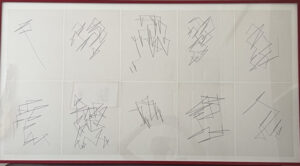 Music of Changes
Music of Changes
A personal legacy...
Mr. Cage died on August 12, 1992 of a stroke at 79 years old.
I didn’t know him the last 14 years of his life.
He was the most influential musician in my life that I ever knew, personally, and I have known some truly great musical artists.
Of the many things I got, I think the thing that really struck me most, musically, from our relationship, was that I had no idea what was actually possible, musically, until I met him...and saw it with my own eyes.
When you die, the only thing that lasts is what you have given to others...and Cage left me changed, in a very, very good way.
Thanks Mr. Cage...really, thanks.
In Historical Retrospect...
In a monophonic musical world begun of the religious traditions of Gregorian Chant in the 7th century, which developed polyphony through Machaut, Dufay, Palestrina, Monteverdi, reached it's height through Handel and Bach, simplified and became homophonic through Hayden, reaching it's clearest expression in Mozart, beginning to burst it's seams with Beethoven, that became excessive with Wagner, was utterly destroyed by Stravinsky and Bartok, being resuscitated through polyphony, by Schoenberg...and along comes Cage, the Samson that brought the temple down and left us this post-apocalyptic pluralism.
There is no more monolithic Western Music tradition to either follow, or rebel, against.
It is gone...The North Atlantic hegemony, European, and then American, has died a perfectly natural death, after 1400 years of vigorous, spectacular and sometimes tragically flawed life.
The good news is that, in a pluralistic world, like after nuclear war, the many cultures that existed, but were not dominant, become respected and listened to...just because they survived. We are inclusive, now...
What do we do now?
With the advent of Iphones and social media the world has become whole and unified through technology.
Will there be another musical tradition that originates from this technical unity as Gregorian Chant did from political unity 1400 years ago? Perhaps...
But for now, as we are in a pluralistic world.
Where are we headed?
As the poet said " I do not concern myself with great matters or things too wonderful for me".
As for me, I am going to write comparatively conservative, secundal, random-generated, 12 tone acoustic music that you hear on Uselesslybeautifulthings.com